Contact Us
American Players Theatre
5950 Golf Course Road
P.O. Box 819
Spring Green, WI 53588
(Map)
Box Office: 608-588-2361
Administration: 608-588-7401
Fax: 608-588-7085
American Players Theatre
5950 Golf Course Road
P.O. Box 819
Spring Green, WI 53588
(Map)
Box Office: 608-588-2361
Administration: 608-588-7401
Fax: 608-588-7085
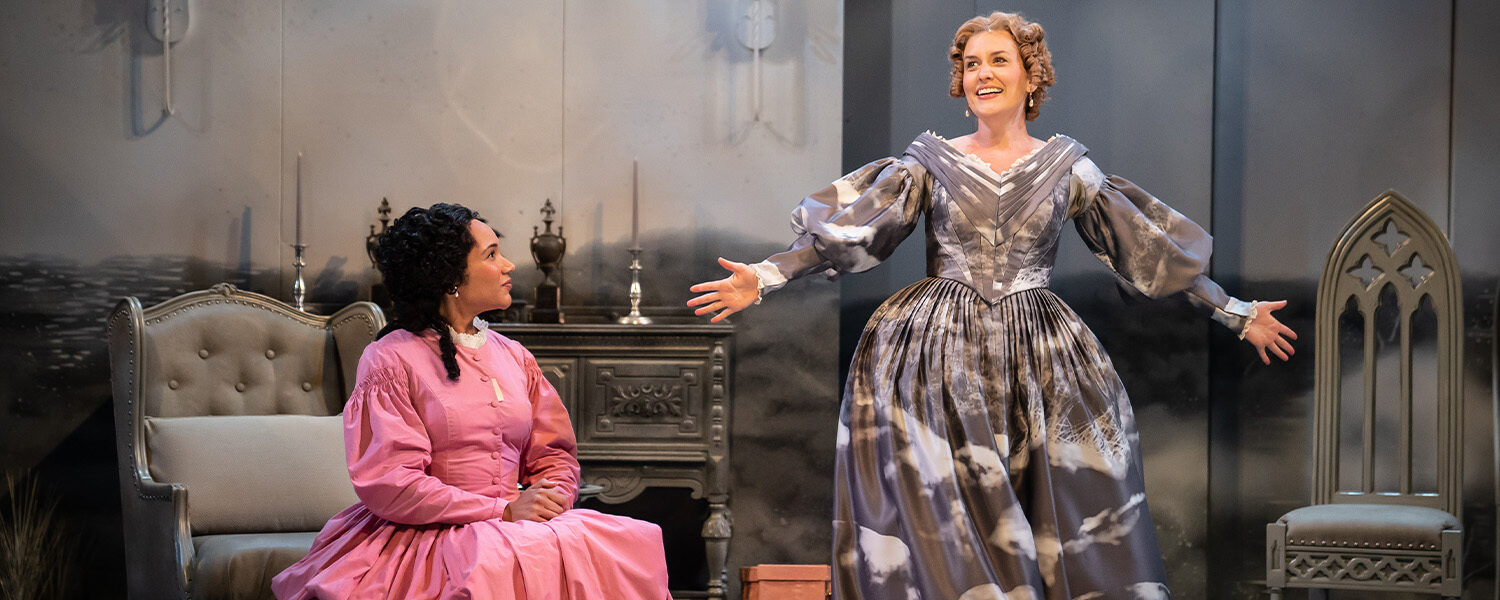
The effervescent and always-brilliant Kelsey Brennan is no stranger to public speaking. In fact, it's kind of her favorite thing in the world. She understands that she might be an outlier when it comes to speaking to thousands of people nightly, especially when considering the fear of public speaking is the most common phobia in the world. Luckily for the rest of us, Kelsey has some insider knowledge when it comes to beating the stage fright and making the most out of your nerves.
I have a weird job.
Eight times a week I show up to a dark basement, ancient building, or arena in the middle of the Wisconsin woods, put on clothes that aren’t mine, and perform a speech, scene, or song while pretending to be someone else in front of 200-1100 people. I’m an actor and performing is my favorite thing in the world.
It’s also a bit of a mysterious job, and people have a lot of questions for me. How do you learn all those lines? Lots of practice. Was the blood real? Absolutely not. Are you married in real life? Nope, that’s as fake as the blood. Do you ever get stage fright? Sure do. Do you ever make mistakes? Pretty much every night. How do you perform in front of all of those people?
For me, this is the least mysterious part. Not because giving a performance in front of peers, colleagues, potential collaborators, or complete strangers is easy—it isn’t!—but because, over the course of my 15 years as a professional actor I’ve learned there are tools I can use—tools that actually work—that lead to repeatable success as a performer, speaker, or presenter.
Create Your Character. One of the most freeing parts of being onstage is pretending to be someone else. I could be having a terrible day, but onstage I might be falling in love for the first time. I may be shaking with nerves on opening night, but if I’m playing a Queen, I better act as though I am calm, confident, and in charge. That’s acting and it can be an amazing tool.
Ask yourself, who do I want to be as I give this presentation? How do I want to show up at our team meeting? What version of me needs to take the lead today and how can I embody that character? It could be as simple as wearing the jacket or giant hoop earrings that make you feel like a boss, or as complicated as pretending to be someone you admire. It all depends on what you need in the moment.
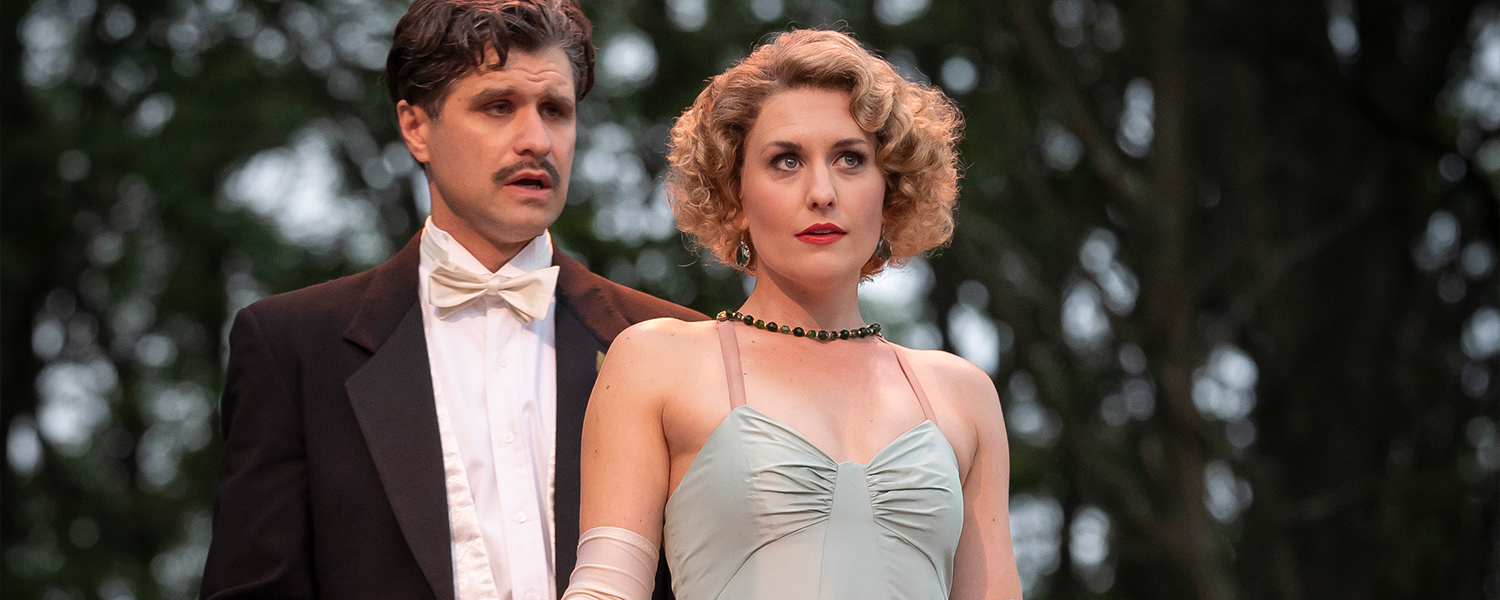
Marcus Truschinski and Kelsey Brennan, Rough Crossing, 2021. Photo by Liz Lauren.
Try it! Give your pitch or presentation in the spirit of Brene Brown, Oprah, or Fred Rogers. Try it as though you were embodying the character and physicality of your mentor, biggest influence, or most confident peer. Take what’s useful and leave the silly impressions for the weekend. You’re a better actor than that!
Get Curious. Any actor worth her salt answers (at least) these three questions before stepping onstage: who am I, what am I doing, and what am I trying to affect in my scene partner? That last one contains all the gold and invites us to consider the people on the receiving end of our presentation.
So let’s do just that. As you plan your pitch, consider the following questions:
Who is my audience?
Where do they live? What do they do for a living? How old are they? What is their cultural context? What do they do for fun? Everything you know about your audience is helpful in planning your approach.
What do I want them to walk away with?
Do you want them to feel inspired/moved/motivated? Do you want them to consider a different approach, learn a new skill, adjust their planning, think about the future? Is there a call to action or an urgency you need to get across?
Why is it important to them? Why is it important to me?
What’s underneath the facts? Where do you get your passion? What do you value? What might be at stake?
What might get in the way?
What questions will you need to answer? What assumptions are in play? Is there the potential for conflict? How will be you be challenged in the presentation itself? Is there technology to perfect, data to consider, research to be done? How will you make sure you have had enough food, water, caffeine? How can you make sure you’re well rested?
How am I going to do it?
What is your approach? What will be the focus? How do you want it to feel? What resources might you need?
Make Friends with Your Nerves. Ah, yes. The nerves. I used to think that if I focused hard enough I could will them away, but my years onstage have taught me instead to accept them as the dependable (though uninvited) little friends that they are.
It typically goes something like this: as prepared and rehearsed as I may be, I suddenly discover the tiniest seed of doubt. My doubting makes me anxious. Then I start worrying about how anxious I am. Then I begin to worry about worrying about how anxious I am and before you know it that seed of doubt has grown into a deep, dark forest of imposter syndrome and I’m sweaty, shaky, short on breath, and barely fighting the urge to hide under a blanket my mommy made me.
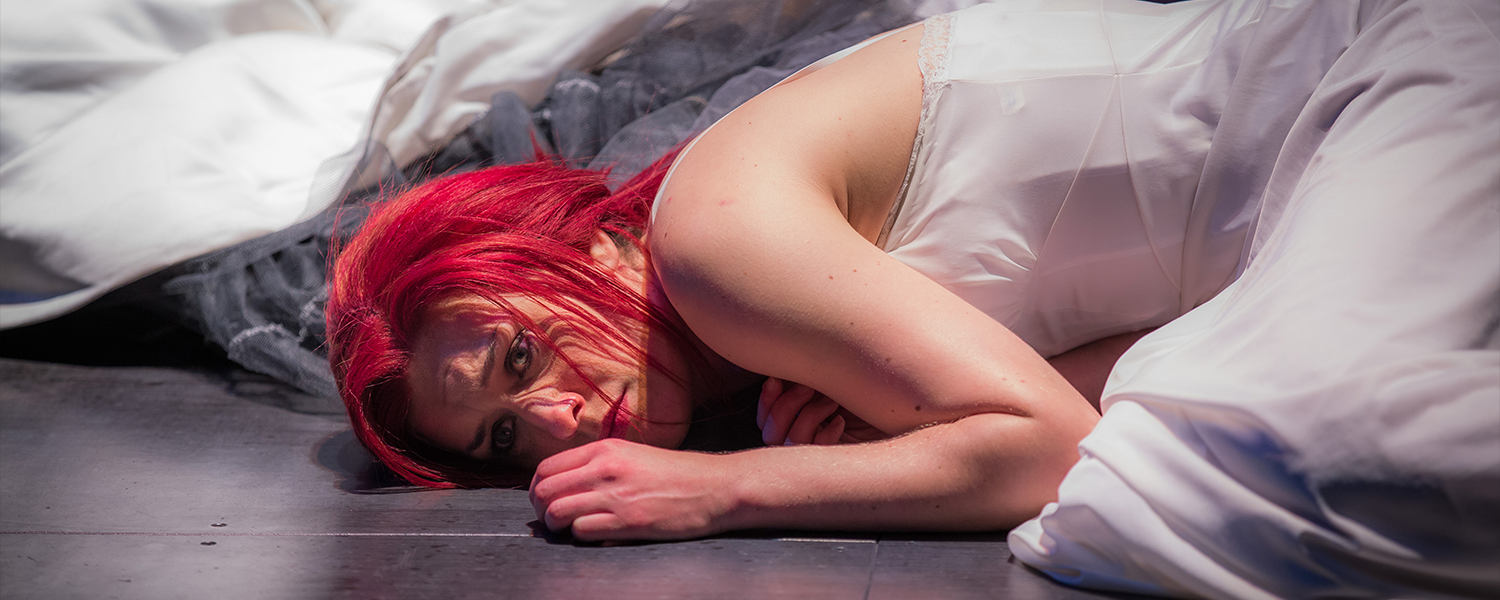
Kelsey Brennan, Eurydice, 2016. Photo by Liz Lauren.
Sound familiar? It’s ok! Next time you find yourself stuck in this vicious cycle, try a grounding exercise to reconnect with your body and bring you into present moment. Here’s an example that should only take 5-10 mins. Find yourself a private place and give it a try:
Stand in a neutral position with your feet shoulder-width apart, knees slightly bent, pelvis slightly tucked, shoulders back and down, head loose, eyes straight ahead.
Starting from the top of your head complete a body scan. With your eyes closed, slowly bring your awareness down your body (as though it’s being scanned), noticing places that may be holding tension (forehead, eyebrows, jaw, shoulders, abdomen) and invite your body to release that tension.
Now, notice what your breath is doing. No need to change it, just notice that it’s there, keeping you going.
Slowly roll down the spine, touching your calves, toes, floor (whatever is available to you). Hang out here for a few breaths. Begin to gently shake out the shoulders and neck, then slowly roll back up to standing, one vertebra at a time.
Shake, shake, shake out your whole body. Woo!
Make the biggest face you can. Bigger! Make the tiniest face you can. Even TINIER!
Blow through your lips (like “blowing raspberries”) to warm up your face and mouth.
Hum from the lowest part of your voice to the highest. Now try highest to lowest. Can you hum while you blow through your lips? (Not a trick question.)
Breathe in for 2 seconds, hold for 2 seconds, breathe out for 4 seconds, rest for 2 seconds. Repeat.
Breathe in for 4 seconds, hold for 4 seconds, breathe out for 8 seconds, rest for 4 seconds.
Repeat.
How do you feel? Maybe a little silly? Refreshed? Energized? Experiment with these types of warming, grounding exercises and find a practice that works for you. Having a process you can repeat each time before you “hit the stage” will teach your body and your mind that it’s time to focus. Even if the nerves are along for the ride.
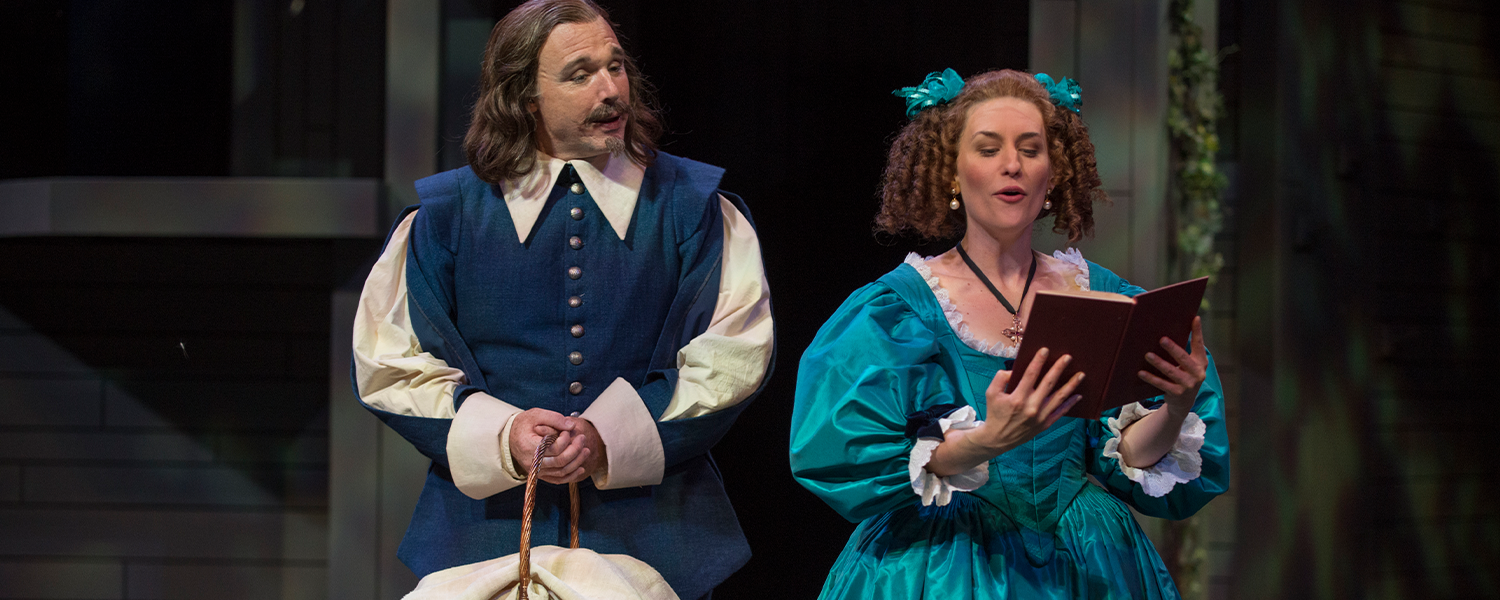
David Daniel and Kelsey Brennan, Cyrano de Bergerac, 2017. Photo by Michael Brosilow.
Rehearse, rehearse, rehearse. Actors remember their lines because we commit them to memory, and speak them all the time. Weeks of rehearsal, six days a week, 8-10 hours a day before we ever greet an audience.
Memorization is a phenomenal tool and often can be a lot more engaging than you think. Find a creative way to organize the information in your brain. Think of your presentation in chapters, Acts, or visualize it as a highway with different rest stops, a river with different tributaries. Whatever engages your mind and allows you to have a confident, natural flow to your performance.
Next, give yourself some time to practice! Give your pitch to an imaginary audience in your bedroom, practice in person with your spouse, ask a friend to listen over zoom. Do all three and do it out loud! The more familiar you are with the words, the easier it will be to bring your personality to the pitch and improvise when you need to.
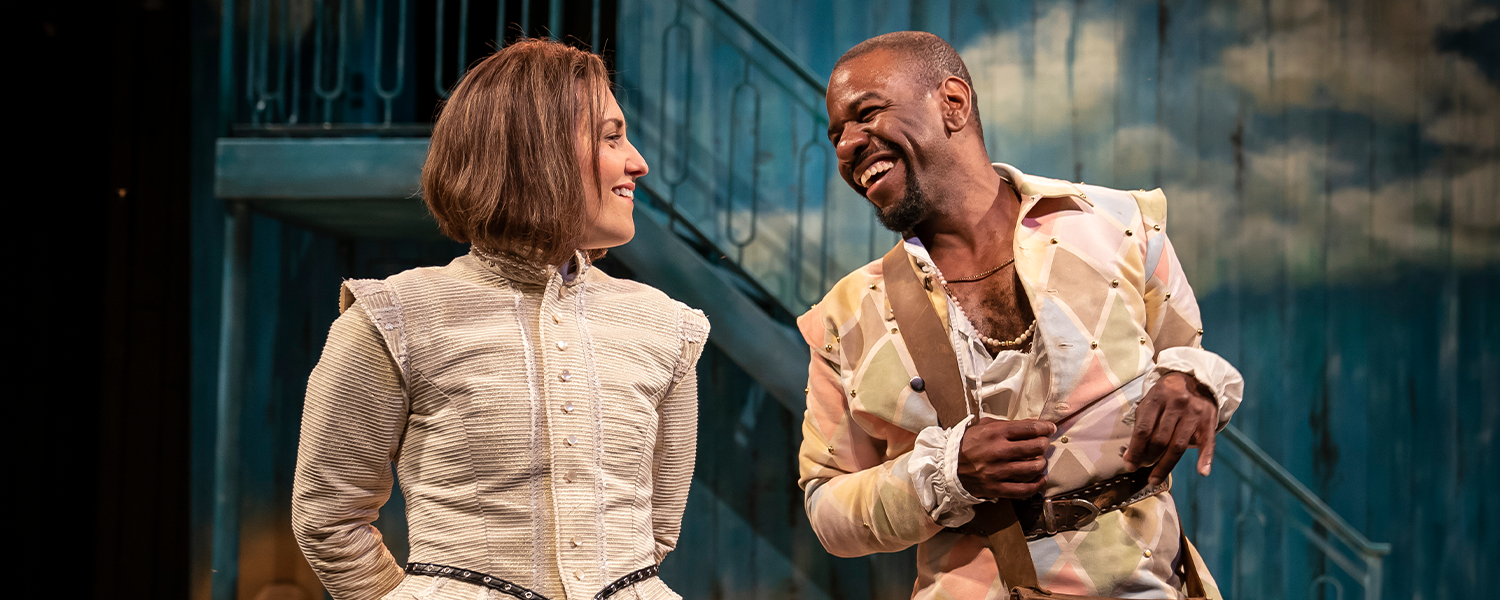
Kelsey Brennan and La Shawn Banks, Twelfth Night, 2019. Photo by Liz Lauren.
Forgive Yourself. Did I mention that I make mistakes virtually every night onstage? Things happen, technology tries to sabotage us, people come in late and can’t find their seats, someone eats a bag of potato chips in the front row, I notice my shoe is untied moments before my big monologue--- it’s ok! The magic of the theatre is that it’s live and anything could happen. The same is true for a pitch, speech, or presentation. Embrace the unexpected.
When the unplanned happens, BREATHE. Acknowledge what’s in the room. And continue to connect with your audience. After all, every story we tell is made for and influenced by our listeners—and they’re human just like you.
Interested in learning more about APT's Professional Development Program? Reach out today!